
Research in the Mathematical Sciences
Scope & Guideline
Empowering Scholars Through Open Access Mathematics
Introduction
Aims and Scopes
- Algebra and Number Theory:
Explores theoretical frameworks and applications of algebraic structures, including group theory, ring theory, and number theory, particularly in relation to modular forms and algebraic geometry. - Geometry and Topology:
Investigates properties and invariants of geometric objects and spaces, focusing on differential geometry, algebraic topology, and related fields, including the study of singularities and manifold structures. - Mathematical Analysis and Partial Differential Equations (PDEs):
Covers topics in real and complex analysis, including functional analysis and the theory of PDEs, with a focus on existence, uniqueness, and stability of solutions. - Combinatorics and Discrete Mathematics:
Addresses combinatorial structures, graph theory, and their applications in various mathematical contexts, including Ramsey theory and enumeration problems. - Mathematical Physics and Applied Mathematics:
Integrates mathematical theories with physical applications, exploring areas such as quantum mechanics, statistical mechanics, and mathematical modeling in various scientific fields. - Computational Mathematics and Algorithm Design:
Focuses on numerical methods, algorithms, and their applications in solving complex mathematical problems, including optimization and machine learning techniques. - Tropical Geometry and Algebraic Geometry:
Studies the interplay between combinatorial properties and algebraic structures, particularly through the lens of tropical geometry and its applications to classical algebraic geometry. - Singularity Theory and Its Applications:
Examines the role of singularities in various mathematical contexts, including algebraic geometry and differential topology, emphasizing their theoretical and practical implications.
Trending and Emerging
- Machine Learning and Neural Networks:
A significant trend towards integrating machine learning techniques, particularly neural networks, into mathematical research, highlighting their applications in optimization and data analysis. - Quantum Mathematics and Modular Forms:
Emerging research on quantum modular forms and their implications in number theory and mathematical physics points to a growing interest in the intersection of these fields. - Tropical Geometry Applications:
Increasing focus on tropical geometry and its applications in algebraic geometry and combinatorics illustrates a shift towards innovative methodologies in these areas. - Nonlinear Dynamics and Chaos Theory:
An uptick in studies addressing nonlinear dynamics, chaos theory, and their mathematical modeling reflects an increasing recognition of their importance in both theoretical and applied contexts. - Complex Systems and Network Theory:
Research that explores complex systems and network theory, especially in relation to mathematics applied to social and biological systems, is gaining traction, indicating a broader interdisciplinary focus. - Singularity Theory and Applications:
A renewed interest in singularity theory, particularly its applications in geometry and topology, suggests a vibrant area of research that is evolving and expanding. - Mathematical Biology and Epidemiology:
The application of mathematical techniques to biological problems, particularly in modeling epidemics and population dynamics, shows a rising trend in the journal's publications.
Declining or Waning
- Classical Real Analysis:
While foundational, traditional topics in real analysis have seen a decrease in focus, possibly due to the rise of more applied and computational approaches that address complex problems. - Elementary Number Theory:
The exploration of elementary number theory concepts has diminished, as more advanced and abstract approaches dominate the discourse in number theory, particularly in relation to modular forms. - Graph Theory Basics:
Basic studies in graph theory are becoming less frequent, with more emphasis now placed on specific applications and advanced topics such as topological graph theory or algebraic graph theory. - Traditional Differential Equations:
Research focusing solely on classical differential equations without modern applications or computational methods has shown a decline, as interest shifts towards more complex and applied differential systems. - Deterministic Mathematical Models:
The focus on purely deterministic models is waning in favor of stochastic models and machine learning approaches that incorporate randomness and uncertainty in mathematical modeling.
Similar Journals
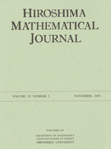
Hiroshima Mathematical Journal
Connecting Researchers Through Innovative Mathematical InsightsThe Hiroshima Mathematical Journal, published by Hiroshima University, Graduate School of Science, serves as a prominent platform for disseminating high-quality research in the field of mathematics. Established in 1959, the journal has been an integral part of the mathematical community, focusing on areas such as Algebra, Number Theory, Analysis, and Geometry and Topology. Although currently classified in Q4 quartile rankings within its categories, the journal is committed to advancing mathematical knowledge and fostering scholarly dialogue. Its accessibility, combined with its long-standing history, makes it an essential resource for researchers, professionals, and students dedicated to exploring and enhancing the mathematical sciences. For those interested in contributing or accessing cutting-edge research, the Hiroshima Mathematical Journal continues to uphold its mission of excellence in mathematical scholarship.
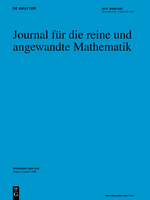
JOURNAL FUR DIE REINE UND ANGEWANDTE MATHEMATIK
Exploring Pure and Applied Mathematics with PrecisionJOURNAL FUR DIE REINE UND ANGEWANDTE MATHEMATIK is a prestigious publication in the field of mathematics, established in 1826 and proudly published by WALTER DE GRUYTER GMBH, a respected name in academic publishing. Renowned for its rigorous peer-review process, this journal focuses on both pure and applied mathematics, making significant contributions to various mathematical domains. With an impressive impact factor positioning it in the Q1 quartile for both applied mathematics and miscellaneous mathematics categories, the journal ranks 83rd out of 399 in General Mathematics and 282nd out of 635 in Applied Mathematics according to Scopus. The journal does not currently offer open access options but is widely available through institutional subscriptions. Its rich history and ongoing commitment to excellence position the JOURNAL FUR DIE REINE UND ANGEWANDTE MATHEMATIK as an essential resource for researchers, professionals, and students aiming to stay abreast of the latest developments in mathematical theory and practice.
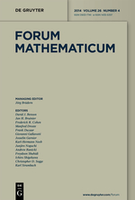
FORUM MATHEMATICUM
Unraveling Complexities: Where Mathematics Meets InsightFORUM MATHEMATICUM, published by WALTER DE GRUYTER GMBH, is a distinguished academic journal based in Germany, known for its significant contributions to the field of mathematics. With an ISSN of 0933-7741 and an E-ISSN of 1435-5337, the journal features comprehensive studies ranging from applied mathematics to diverse mathematical disciplines. Having maintained a commendable presence since 1989, FORUM MATHEMATICUM has achieved notable classification rankings, including Q2 in Applied Mathematics and Q1 in miscellaneous Mathematics as of 2023. Additionally, it holds a Scopus rank within the top 60th percentile in General Mathematics, making it a prominent platform for researchers and professionals seeking rigorous analysis and innovative methodologies in mathematics. While the journal does not currently offer open access, its rich content is pivotal for advancing mathematical theory and applications, appealing to students and seasoned academics alike.
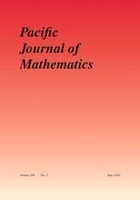
PACIFIC JOURNAL OF MATHEMATICS
Connecting Scholars through Impactful Mathematical ResearchThe PACIFIC JOURNAL OF MATHEMATICS, established in 1951 and published by Mathematical Sciences Publishers, is a premier peer-reviewed journal in the field of mathematics, renowned for its rigorous scholarship and impactful research contributions. With an HIndex that reflects its sustained academic influence, this journal has been categorized within the Q1 quartile in the field of mathematics (miscellaneous) as of 2023, showcasing its position among the top-tier mathematics journals globally. Although the journal operates under a traditional subscription model rather than an Open Access format, it remains dedicated to disseminating original research that spans various domains within mathematics. Researchers, professionals, and students alike will find the journal's breadth of topics and commitment to quality work instrumental in advancing their understanding and exploration of mathematical concepts. This esteemed journal continues to thrive as a vital resource for the mathematical community through its comprehensive collection of articles from a diverse range of mathematical disciplines, thus maintaining a significant role in shaping the future of mathematical inquiry.
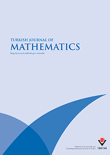
Turkish Journal of Mathematics
Exploring the Depths of Mathematical KnowledgeTurkish Journal of Mathematics is a prestigious academic publication dedicated to the advancement of mathematical research across a variety of subfields. Established in 1995 and published by the Tubitak Scientific & Technological Research Council Turkey, this journal has built a solid reputation, especially noted for its significant contributions to the field over the years, with its convergence spanning from 1995 to 2002 and again from 2006 to 2024. The journal, which holds a commendable Q2 ranking in Mathematics (miscellaneous) and is positioned in the 66th percentile of Scopus rankings for General Mathematics, aims to disseminate high-quality original research, reviews, and innovative methodologies to advance both theoretical and applied mathematics. Researchers, professionals, and students alike will find invaluable resources within its pages, providing insights that are pivotal for academic and practical applications in mathematics. Although it does not currently offer open access options, the journal remains an essential platform for those looking to engage with the forefront of mathematical inquiry.
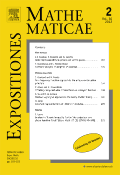
EXPOSITIONES MATHEMATICAE
Fostering Original Research in Diverse Mathematical FieldsEXPOSITIONES MATHEMATICAE, published by Elsevier GmbH, stands as a significant journal in the realm of mathematics, catering primarily to researchers, professionals, and students. With an ISSN of 0723-0869 and an E-ISSN of 1878-0792, this journal has made its mark in the academic community, boasting a Q2 classification in the miscellaneous mathematics category for 2023, illustrating its prominence within its field. The journal addresses a diverse scope of mathematical topics, encouraging the publication of original research and innovative theories while maintaining rigorous academic standards. As it converges from 2004 to 2024, EXPOSITIONES MATHEMATICAE continues to be an essential resource for advancing mathematical knowledge and fostering scholarly communication, despite being a non-open-access publication. Its location in Munich, Germany further anchors it within a rich intellectual tradition, providing accessibility for the mathematical community worldwide.
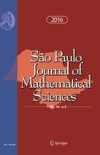
Sao Paulo Journal of Mathematical Sciences
Fostering collaboration through cutting-edge research in mathematics.Welcome to the Sao Paulo Journal of Mathematical Sciences, a pivotal platform dedicated to advancing the field of mathematics, published by Springer International Publishing AG. Established in 2015 and running until 2024, this journal serves as a vital resource for researchers, professionals, and students interested in a plethora of mathematical topics, including computational theory, statistics, and general mathematics. While the journal holds a current Q4 quartile ranking in its categories, it provides an opportunity for contributors to disseminate innovative findings in an accessible manner. Although not an open-access publication, the journal is committed to ensuring that high-quality research is available to the academic community, fostering collaboration and growth within the discipline. Researchers seeking to publish in a dynamic and developing journal should consider the Sao Paulo Journal of Mathematical Sciences as an essential avenue for their work.

Portugaliae Mathematica
Unveiling New Perspectives in MathematicsPortugaliae Mathematica is a distinguished open-access journal published by the European Mathematical Society (EMS), dedicated to the field of mathematics. With its ISSN 0032-5155 and E-ISSN 1662-2758, this journal aims to disseminate high-quality research papers, reviews, and notable contributions in various domains of mathematics. Located in Germany, it has been actively publishing since 2011 and operates under the address Publishing House GmbH, Inst Mathematik, Technische Universität Berlin, Straße 17, Juni 136, Berlin 10623, Germany. The journal has embraced an open-access model since 2022, enhancing the accessibility of mathematical research to a global audience. With a current Scopus rank placing it in the 29th percentile in the miscellaneous mathematics category, it provides a platform for both emerging and well-established researchers to share their findings. Despite its Q4 ranking, the journal plays a crucial role in fostering mathematical inquiry and collaboration. Researchers, professionals, and students alike will find Portugaliae Mathematica an invaluable resource for enriching their expertise and staying abreast of developments in the mathematical sciences.
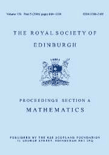
PROCEEDINGS OF THE ROYAL SOCIETY OF EDINBURGH SECTION A-MATHEMATICS
Elevating the Standards of Mathematical ScholarshipPROCEEDINGS OF THE ROYAL SOCIETY OF EDINBURGH SECTION A-MATHEMATICS is a prestigious journal published by Cambridge University Press, focusing on high-quality research in the field of mathematics. Established in 1975, this journal has carved a niche in the academic community, evidenced by its categorization in the Q1 quartile for Mathematics (miscellaneous) in 2023 and a commendable Scopus rank of #59 out of 399 in General Mathematics, positioning it within the 85th percentile among its peers. The journal serves as a platform for disseminating innovative mathematical theories and methodologies, making it an essential resource for researchers, professionals, and students alike. Though not currently an open-access publication, it offers various access options catering to a broad audience. With a publication timeline extending through to 2024, PROCEEDINGS OF THE ROYAL SOCIETY OF EDINBURGH SECTION A-MATHEMATICS remains committed to advancing mathematical knowledge and fostering a scholarly environment conducive to scientific inquiry and collaboration.

Revista de la Real Academia de Ciencias Exactas Fisicas y Naturales Serie A-Matematicas
Advancing Mathematical Frontiers with ExcellenceRevista de la Real Academia de Ciencias Exactas Fisicas y Naturales Serie A-Matematicas, published by SPRINGER-VERLAG ITALIA SRL, is a premier academic journal based in Italy that serves as a significant platform for researchers and practitioners in the fields of Mathematics. With a focus on core areas such as Algebra, Analysis, Applied Mathematics, Computational Mathematics, and Geometry and Topology, this journal boasts an impressive performance in academic rankings, achieving Q1 status in multiple categories, reflecting its excellence in disseminating high-quality research. The journal is easily accessible through subscription options and provides a vital resource for the mathematics community, fostering the exploration of innovative ideas and methodologies. The journal’s commitment to advancing mathematical knowledge is evident through its competitive Scopus rankings, including a remarkable rank of #1 in Algebra and Number Theory, placing it in the top percentile of its field. Scholars and students alike will find in this publication a rich source of impactful research that not only contributes to the academic discourse but also enhances the practical applications of mathematics in today's society.